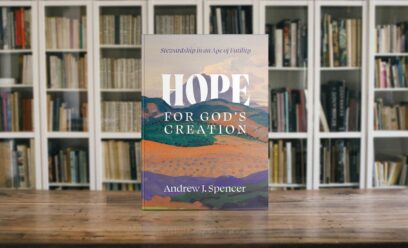Christian parenting in a confusing world of gender identity
This article was first published in the Social Issues Bulletin – Issue 54: Winter 2023.

Once upon a time (not so long ago) after asking for your name and date of birth, medical and other forms asked for sex/gender with the option to choose either male or female. The terms sex and gender were mostly synonymous and the reply expected was that of biological sex.
Understanding the terminology
Biological sex is determined at conception and (except for some very rare chromosomal conditions) every human being has either XX (female) or XY (male) sex chromosomes. These determine the physical development of the fetus so that – again apart from some very rare medical conditions – the sex of a baby is easily observed at birth by looking at the genitalia.
There have always been a few children who, for a variety of reasons, have struggled with their sex (or the expectations and gender stereotypes) and have believed themselves to be, or wanted to be, the opposite sex. Studies in the past have shown that the vast majority of these children would grow up to be comfortable with their biological sex[1].
Gender dysphoria is a term that is used to describe a sense of unease that a person may have because of a mismatch between their biological sex and their gender identity.[2]
It is now the case that the term gender is no longer synonymous with biological sex and generally means something different. The WHO defines gender like this:
…the characteristics of women, men, girls and boys that are socially constructed. This includes norms, behaviours and roles associated with being a woman, man, girl or boy, as well as relationships with each other. As a social construct, gender varies from society to society and can change over time.[3]
Gender identity is used to mean something different again and is defined by the NHS as ‘our sense of who we are and how we see and describe ourselves.’ A person may therefore express a gender identity which is different to their biological sex and they may identify as male, female, non-binary or any one of an increasing number of identities.
Sometimes I think it’s difficult for us to comprehend just how much has changed in just the last 10 years as ‘transgender’ seems to have taken such a prominent place in our society. We find ourselves in a world where feelings trump physical reality and where expressing anything other than complete acceptance and celebration of someone’s identity can result in us being labelled bigots or transphobic. Our children (and grandchildren) are growing up in a very different world to the one we did so we must understand what they are being surrounded with and think carefully about how we as Christians can hold firm to the truth of the Bible and its goodness and pass that on to the next generation.
Increase in gender dysphoria (GD) and mental health problems
You may be wondering why we need to be concerned about this. Yes, it seems to be in the news almost every day with articles about Drag Queen story times in libraries; arguments over whether transwomen (biological males identifying as women) should be allowed into female only spaces or to compete in female sports, and the impending closure of the controversial Tavistock gender identity development clinic, but does this really affect our children?
Children and young people are increasingly experiencing significant mental health difficulties – in it’s 2022 report, The Children’s Society reported that there had been a 50% increase in young people experiencing mental health problems in the last 3 years.[4] While a greater awareness of mental health problems is helpful for those experiencing clinical depression or significant anxiety, we are seeing more and more young people self-diagnosing themselves with anxiety, depression and even autism or ADHD. The rise in mental health problems was a concern even before Covid and this has only intensified as young people were isolated and spent endless enforced hours alone in their rooms ‘learning’ online.
We also see from the following chart that the number of children being referred to the Tavistock clinic with gender dysphoria has increased at an alarming rate:

The reality is that the referrals to the specialist clinic do not necessarily reflect the true numbers of those who are experiencing distress around their gender or questioning their gender. Many will not seek a medical referral and there may be a variety of reasons for this. Some young people do not experience distress and as a result, do not feel the need for medical or psychological input: they may present in an androgynous way and identify as non-binary or agender. Many parents who are concerned about their child or young person heading down a medical/surgical pathway may be afraid that professionals will simply agree with their child’s gender identity and undermine them as parents.
All too often young people are trying to make sense of a variety of mental health problems and other distress through the lens of gender. Set up in 2019 by parents of children identifying as trans or non-binary, the Bayswater Support Group has produced the extremely helpful infographic below which encourages us to see gender distress and trans-identification as the visible tip of the iceberg and emphasises the need to look at the many possible contributing factors that may be lurking beneath the surface.

Teaching in schools
Two recent reports have exposed the extent to which children are being exposed to inappropriate and ideological content both in RSE/PSHE and throughout the curriculum.[5] In addition, a survey conducted by the Association of Christian Teachers reveals the concerns and difficulties faced by Christian teachers being expected to teach material on sex, relationships and gender identity that is inaccurate or inappropriate.[6]
Educate and Celebrate (an educational organisation) describes how nursery and primary schools can refashion themselves to be ‘gender-neutral’ and suitable for ‘children of all genders’ because young children are ‘fluid’:
Children are so open-minded and ready to listen, they have no set views and they are fluid in their ideas and understanding and readily accept, given the opportunity to do so. To support them, teachers need to be ready with songs, books and examples in their repertoire and jump at any opportunity to challenge preconceived views in young children.
Dana: Educate & Celebrate Best Practice nursery teacher
Examples of the kind of books recommended for young children include: Who Are You? The kid’s guide to gender identity which tells children ‘Babies can’t talk, so grown-ups make a guess by looking at their bodies’, and that there are more than two choices of gender: ‘trans, genderqueer, non-binary, gender fluid, transgender, gender neutral, agender, neutrois, bigender, third gender, two-spirit…’ and ‘you are who you say you are because YOU know you best’.
Children are often not being taught the biological reality that sex (male or female) is determined at conception and that every cell in their bodies (with a few incredibly rare exceptions) carries either XX or XY chromosomes. It is not possible to change sex – medical and surgical interventions may change a person’s appearance so that they look more like the opposite sex but they will never actually change sex.
However, the situation in schools and health provision is such that so often as soon as a child or young person expresses any kind of wish to be the opposite sex or to be unhappy with the way they are, this is immediately jumped on and the preferred gender identity is affirmed. There have been many reports of this taking place even without parental knowledge – some parents have only discovered their child is using different names and surnames when the school has accidentally sent a letter using them.
When a child identifies as trans this doesn’t just affect them and their family; it affects all those around them as well, in particular the other children in their class and school who may be expected to use new names or pronouns that don’t match biological sex and who may get into trouble if they are unable to or even if they forget.
Social transition
Changing of name/pronoun or dressing/presenting as the opposite sex is known as social transition. Many people think that it is just a kind thing to do and doesn’t really matter as long as it makes the child comfortable, however evidence is growing that allowing social transition increases the likelihood of the gender identity/dysphoria persisting and sets a child on a pathway to transition.[7]
An independent review of NHS services for children with gender dysphoria states:
Social transition – this may not be thought of as an intervention or treatment, because it is not something that happens within health services. However, it is important to view it as an active intervention because it may have significant effects on the child or young person in terms of their psychological functioning. There are different views on the benefits versus the harms of early social transition. Whatever position one takes, it is important to acknowledge that it is not a neutral act, and better information is needed about outcomes.[8]
Social media
iGen is defined as the first generation who have gone through their whole adolescence in the age of the smartphone. When I first started going into primary schools teaching Lovewise material (around 10 years ago) only a few children in a year 6 class would own mobile phones and these would generally not be smartphones. Today it would be highly unusual for any child in year 6 (or even year 5) to not have a smartphone. 10 year olds happily tell me the age limits for various social media platforms and justify still being on those platforms saying their parents have let them have accounts.
Young people spend large amounts of their time on social media and algorithms mean that they will see more and more of the same type of material. There is a plethora of content that encourages children and young people to think they are trans and gives overwhelmingly positive stories of young people undergoing medical and surgical transition. Young people are often coached into how to ‘come out’ to their parents; what to say to get medical intervention, and that anyone who doesn’t immediately agree with them and celebrate their new identity doesn’t understand them or hates them.
Detransitioners
There are a growing number of people coming forward who, having undergone some degree of transition, decide to return to identifying as their biological sex (several stories can be found on the Bayswater Support website[9]). Some people who transition come to a point when they realise they have made a terrible mistake and that gender wasn’t the real issue – often they have embarked on medical and surgical treatment only to discover that the problems they had are still there and that in addition to the mental health difficulties they started with, they now have physical problems as a result of hormone treatment and/or surgery. The number of detransitioners is likely to rise as increasingly younger people have commenced medical and/or surgical transition.
Christian perspective
As Christians we believe that we have been created by God and that our bodies are important. We are created in God’s image and being male or female is part of what that means:
So God created mankind in his own image,
Genesis 1:27
in the image of God he created them;
male and female he created them.
Our identity is given to us by God our creator and is not something we either have to decide or discover. Andrew Bunt has written an excellent book Finding Your Best Identity which explores this in more detail and Sam Alberry’s book What God Has to Say about Our Bodies is also very helpful.
So how can we as Christians try to ensure that our children are not deceived by the culture of ideology and expressive individualism (for more on this read Strange New World by Carl Truman or Pride: Identity and the Worship of Self by Matthew Roberts) and what do we do when our children are taken in and declare a trans identity?
What can we do?
- Be well informed – reading this article is a good start but only touches on the topic and on many of the aspects that need to be understood. There are many books on the subject of transgender and it is helpful to read a variety of secular and Christian books (I’ve put together a list of useful books at the end of this article) which together help us to have a better understanding of what we are facing. A new Christian book by Patricia Weerakoon, The Gender Revolution, is an excellent book which includes some very helpful insights and advice around children and young people who identify as trans which has been missing from available Christian books on the topic.
- Teach our children biblical and biological facts at ages appropriate to them – we need to make sure that our children are well taught and that they have a good understanding of the importance of bodies. Children should be taught about body parts and their proper names by their parents – including differences between boys and girls without endorsing unnecessary gender stereotypes – and this is done in a natural way from a young age. As they get older and approach puberty it is vital that they are prepared for the changes that will happen to their bodies in the context of being created by God and that the changes of puberty have a good purpose – changing us from children to adults. Lovewise has resources that can support parents to talk about this with their children[10]. These conversations lay the foundations for children and ground them in reality and the goodness of God’s creation and also allow for ongoing conversations as they are exposed to other perspectives.
- Find out what children are being taught at school and challenge if needed – there is widespread concern (not just among Christians) about some of the content that children are being taught and about the approaches often taken to children who question their gender. As parents, you have the primary responsibility for your child and you have the right to information about what they will be learning in PSHE/RSE and across the curriculum (including asking about books in the school library) and about what approaches the school takes/might take to a child declaring a gender identity. Schools often take an approach because they genuinely believe they are doing the right thing and so often a gentle, questioning approach can be productive. There are several organisations that can be very helpful in supporting parents as they challenge schools[11].
- Limit screen time and monitor what they are accessing – one of the aspects of gender identity is the disconnect between bodily reality and how someone feels – feelings trump reality. It is important therefore to ground our children in physical reality as much as possible. Spend time with them, get out and about and do fun things together as much as you can. Encourage them to meet up with friends to join clubs and youth groups rather than just spending time online. And be interested in what they are doing online rather than just being dismissive of the latest TikTok or meme.
- Listen to them – as your child gets older it becomes increasingly important to really listen to them even (or perhaps especially) when they seem to be saying things that you don’t understand or you know not to be true. As you listen you can reflect back to them and ask questions that show you are genuinely interested in how they feel and what they think. As you ask questions they may naturally begin to question themselves and you can also take natural opportunities to give your thoughts (in a non-confrontational way) and to state biological and biblical truth (which you taught them when they were younger – point two above).
- Pray – hopefully you are already praying for your children every day so keep going, they need it!
Useful resources
If your child is already struggling with gender identity then here are a few resources you might find helpful:
- An article I wrote a little while ago: https://www.livingout.org/resources/articles/111/parenting-a-child-questioning-their-gender-identity
- A new secular book called When Kids Say They’re Trans by Stella O’Malley, Sasha Ayad and Lisa Marchiano.
- Bayswater Support Group (https://www.bayswatersupport.org.uk/) is a secular organisation that provides valuable support for parents of trans-identified children
- True Freedom Trust (https://www.truefreedomtrust.co.uk/) is a Christian organisation (and Affinity member) that can provide support.
Useful books
- The Gender Revolution by Patricia Weerakoon
- Growing Up God’s Way by Dr Chris Richards and Dr Liz Jones
- Challenges to Living God’s Way by Dr Chris Richards and Dr Liz Jones
- Trans by Helen Joyce
- Irreversible Damage by Abigail Shrier
- Embodied by Preston Sprinkle
- The Genesis of Gender by Abigail Favale
FOOTNOTES:
[1] https://statsforgender.org/wp-content/uploads/2021/10/Gender-related-distress-will-alleviate-for-around-80-of-pre-teen-children-once-they-become-teenagers.pdf
[2] See: https://www.nhs.uk/conditions/gender-dysphoria/
[3] https://www.who.int/health-topics/gender
[4] https://www.childrenssociety.org.uk/good-childhood
[5] See: https://www.newsocialcovenant.co.uk/wp-content/uploads/2023/08/nscu-education-2023-v1.pdf and https://policyexchange.org.uk/wp-content/uploads/Asleep-at-the-Wheel.pdf
[6] https://www.christian-teachers.org.uk/speaking-up/rse-report
[7] https://statsforgender.org/wp-content/uploads/2021/10/Social-transition-.pdf
[8] https://cass.independent-review.uk/wp-content/uploads/2022/03/Cass-Review-Interim-Report-Final-Web-Accessible.pdf
[9] https://www.bayswatersupport.org.uk/detrasitioners-videos/
[10] Visit: https://lovewise.org.uk/christian-sex-education-resources/
[11] The Christian Institute: https://www.christian.org.uk/
Safe Schools Alliance UK: https://safeschoolsallianceuk.net/
Parent Power: https://parentpower.family/

Stay connected with our monthly update
Sign up to receive the latest news from Affinity and our members, delivered straight to your inbox once a month.



